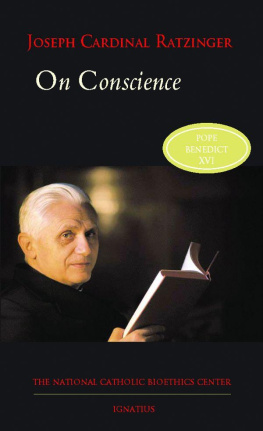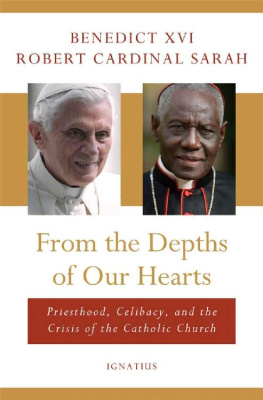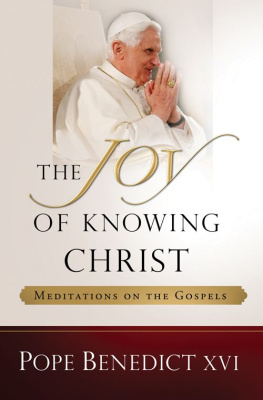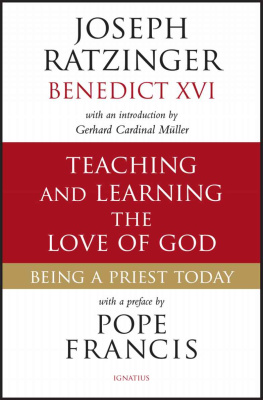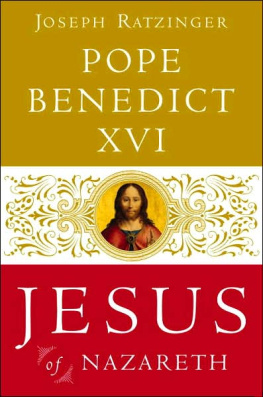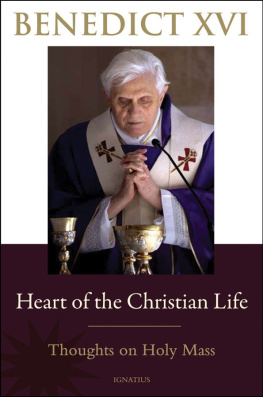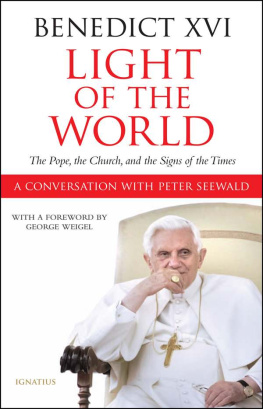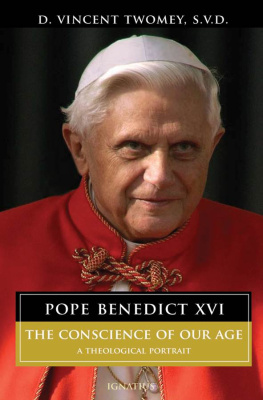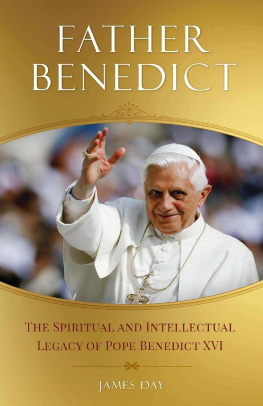Pope Benedict XVI - On Conscience (Bioethics & culture series)
Here you can read online Pope Benedict XVI - On Conscience (Bioethics & culture series) full text of the book (entire story) in english for free. Download pdf and epub, get meaning, cover and reviews about this ebook. year: 0, genre: Religion. Description of the work, (preface) as well as reviews are available. Best literature library LitArk.com created for fans of good reading and offers a wide selection of genres:
Romance novel
Science fiction
Adventure
Detective
Science
History
Home and family
Prose
Art
Politics
Computer
Non-fiction
Religion
Business
Children
Humor
Choose a favorite category and find really read worthwhile books. Enjoy immersion in the world of imagination, feel the emotions of the characters or learn something new for yourself, make an fascinating discovery.
- Book:On Conscience (Bioethics & culture series)
- Author:
- Genre:
- Year:0
- Rating:5 / 5
- Favourites:Add to favourites
- Your mark:
- 100
- 1
- 2
- 3
- 4
- 5
On Conscience (Bioethics & culture series): summary, description and annotation
We offer to read an annotation, description, summary or preface (depends on what the author of the book "On Conscience (Bioethics & culture series)" wrote himself). If you haven't found the necessary information about the book — write in the comments, we will try to find it.
On Conscience (Bioethics & culture series) — read online for free the complete book (whole text) full work
Below is the text of the book, divided by pages. System saving the place of the last page read, allows you to conveniently read the book "On Conscience (Bioethics & culture series)" online for free, without having to search again every time where you left off. Put a bookmark, and you can go to the page where you finished reading at any time.
Font size:
Interval:
Bookmark:
Bioethics & Culture Series
Edward J. Furton, General Editor
The National Catholic Bioethics Center was founded in 1972 to provide expert moral analysis and philosophical reflection in the fields of medicine, science, and technology. The NCBC seeks to promote and safeguard the dignity of the human person through research, education, consultation, and publishing. This mission, carried out for the sake of all people, is done with openness to the findings of science and with fidelity to the teachings of the Catholic Church. The NCBC includes among its key constituencies bishops and other clergy, healthcare workers and academics, those who shape law and public policy, and numerous individuals who seek clarity on critical health-care issues affecting their families.
The National Catholic Bioethics Center
6399 Drexel Road
Philadelphia, PA 19151
www.ncbcenter.org
Two Essays
by Joseph Ratzinger
T he N ational C atholic B ioethics C enter
Philadelphia
IGNATIUS PRESS SAN FRANCISCO
1984 and 1991 by Libreria Editrice Vaticana
All rights reserved.
Published by The National Catholic Bioethics Center
and Ignatius Press
2007 by Ignatius Press, San Francisco, California, USA
All rights reserved.
Cover photograph of Joseph Ratzinger
2006 Gianni Giansanti / Corbis
Cover design by Roxanne Mei Lum
The essays in this book were originally published by The Pope John XXIII Medical-Moral Research and Education Center (The Pope John Center), which changed its name in 1998 to The Nationai Catholic Bioethics Center. The essays have been lightly edited for this edition, for punctuation and consistency of style.
Conscience and Truth originally appeared in Catholic Conscience: Foundation and Formation (Proceedings of the Tenth Bishops Workshop), edited by Russell E. Smith 1991 The Pope John Center, Braintree, Massachusetts. It was reprinted as Conscience and Truth , by Joseph Cardinal Ratzinger 2000 The National Catholic Bioethics Center, Boston, Massachusetts.
Bishops, Theologians, and Morality first appeared in Moral Theology Today: Certitudes and Doubts (Proceedings of the Fourth Bishops Workshop), edited by Donald G. McCarthy 1984 The Pope John Center, St. Louis, Missouri.
National Catholic Bioethics Center
ISBN-10: 0-935372-48-2
ISBN-13: 978-0-93537248-9
Library of Congress control no. 2005014048
Ignatius Press
ISBN-10:1-58617-160-7
ISBN-13:978-1 -58617-160-5
Library of Congress control no. 2006920164
Contents
I
II
This small volume contains two essays on conscience by Joseph Cardinal Ratzinger, now Pope Benedict XVI, written while he was Prefect of the Congregation for the Doctrine of the Faith. They should be put in context. They were both presented at workshops for bishops organized by The National Catholic Bioethics Center, then known as the Pope John XXIII Medical-Moral Research and Education Center. Since 1973, the center has organized workshops on medical-moral and bioethical topics, which have been attended by bishops from Canada, Mexico, Central America, the Caribbean, the Philippines, and the United States. These have always been fully and generously funded by the Knights of Columbus.
The NCBC bishops workshops have always included topics of a more general theological or philosophical nature as well as topics dealing with quite specific issues such as abortion, sterilization, euthanasia, in vitro fertilization, and so forth. On two occasions, Cardinal Ratzinger presented the keynote address at these gatherings, first in 1984 and again in 1991.
In 1984, the workshop examined the relationship between the magisterium of the Church and theologians. In 1991, the workshop focused specifically on conscience and its exercise in particular circumstances. It is interesting that Benedict XVIs reflection on the working relationship between bishops and theologians was as concerned with the issue of conscience as was his address at the 1991 workshop, which dealt specifically with conscience. Although these addresses were separated by seven years and two different workshop themes, they both show that Cardinal Ratzingers thought was profoundly occupied with the phenomenon of conscience. Consequently, the two essays together form a remarkably consistent theme for this little book.
The reflections of Benedict XVI show that contemporary debates over the nature of conscience have deep historical and philosophical roots, which can be traced back to the Enlightenment and beyond. The presentation of conscience as a subjective and, at the same time, infallible capacity for moral judgment manifests itself in the false opposition often posed between the magisterium as an external authority, imposing its decrees on hapless members of the Church, and the individuals personal, subjective conviction as to what is right. While Cardinal Ratzinger certainly accepts that one is bound to act in accord with a sure conscience, even if it is mistaken, he makes it clear that there must be sources for the judgment of conscience other than the subjective reflections of each individual. His wry humor is apparent as he remarks,
It is strange that some theologians have difficulty accepting the precise and limited doctrine of papal infallibility, but see no problem in granting de facto infallibility to everyone who has a conscience. (66)In these addresses, the Pope points out that there would be no moral norms at all if each person were able, with absolute certitude, to declare for himself what is morally right in every circumstance. What saves one from complete moral relativism are a number of factors necessary for morality: conscience, the shared experience of the community of which one is a part, reality itself, and finally what God has revealed of his will for us. Without these counterbalances to subjectivism, one faces the threat of a totalitarianism of the powerful arising from their own arbitrary decisions. This is precisely the theme Cardinal Ratzinger took up when he preached to the Cardinals before they went into the conclave that elected him Pope Benedict XVI. He warned them of their duty to protect the Church and the world from a dictatorship of relativism.
When the only thing that determines what is morally right is ones individual, subjective judgment, then there is no overarching moral truth to which all are bound. In such a situation, those who have the greatest power can impose their positions on others, unchecked by any authority apart from themselves. Indeed, such an understanding of the infallibility of a subjective conscience would free from guilt, for example, even those who had committed unspeakable atrocities under German National Socialism (23). Pope Benedict is not prepared to ascribe such infallibility to subjective moral conviction. The nature of conscience is such, Cardinal Ratzinger has told us, that it could not possibly be blinded to the unspeakably heinous character of Nazi crimes. There would have to have been a degree of culpable silencing of conscience. No one can ultimately silence the voice of conscience that resides in each of us. No one can ultimately ignore the moral law that God Himself has inscribed on our hearts.
One of the characteristics of the scholarly work of Cardinal Ratzinger was always his ability to look at perennial problems from an unexpected perspective and address them in a novel way. He did this in his 1991 address when he spoke of the fundamental disposition to do good and avoid evil that is constitutive of every human being.
At least since the Middle Ages, the Catholic moral tradition has referred to this disposition as synderesis, an unfamiliar, technical term that is used in virtually no other context than Catholic moral theology. In his 1991 address, Cardinal Ratzinger boldly and innovatively reached back to Plato and borrowed his term anamnesis to refer to this disposition (36). Plato taught that the Socratic method of teaching through questioning was a means of bringing the student to remember what he already knew. Cardinal Ratzinger believed that the concept of anamnesis communicated more effectively than synderesis the recalling of what constitutes our very being in terms of doing good and avoiding evil. This necessary recalling of our need to be disposed toward good and against evil helps avoid the subjectivism which he sees as so dangerous in our day.
Font size:
Interval:
Bookmark:
Similar books «On Conscience (Bioethics & culture series)»
Look at similar books to On Conscience (Bioethics & culture series). We have selected literature similar in name and meaning in the hope of providing readers with more options to find new, interesting, not yet read works.
Discussion, reviews of the book On Conscience (Bioethics & culture series) and just readers' own opinions. Leave your comments, write what you think about the work, its meaning or the main characters. Specify what exactly you liked and what you didn't like, and why you think so.

